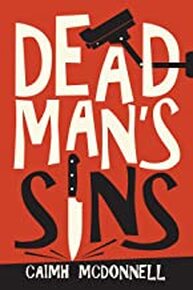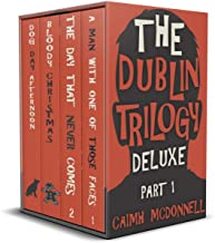 It is fair to say that I am a fan of the work of Caimh (pronounced Keeve) McDonnell. I have never made a secret of it. I won’t rest easy until his books are being read by the whole of the British and Irish reading public and a fair few other nationalities in the English speaking world (apologies to the Irish who speak Gaelic as their first language). It therefore gives me great pleasure to review “Dead Man’s Sins” and award it five stars. It isn’t the plot that makes this book so enjoyable. It is OK, it gets the job done and all that. No, it’s the dialogue.  In places the dialogue is so authentic and humorous that you feel you are listening into a conversation in a Dublin pub. It is the personification of “the craic” and you can almost smell the Guinness fumes rolling off the page (or through the screen of your e-reader). I would give you a few extracts to demonstrate what I mean but, taken out of context, they would be meaningless. Believe me, I tried, but I had to delete them because they didn’t give me the delight they did when they were part of the book. So I guess you’ll just have to trust me.  Caimh McDonnell started off writing “The Dublin Trilogy” a few years ago and the series now contains so many books that the word “trilogy” has been rather bent out of shape. There is also a spin off series set in New York, but I won’t go into that here, even though it does feature the main character from this book, which is set before he departs for the Big Apple. “Dead Man’s Sins” is book 5 of The Dublin Trilogy and is also a sequel to “Angels in the Moonlight”, which is book 3, but is set several years before books 1 and 2. And “Dead Man’s Sins” came out after Book 4, which is set after Book 2. Look, if you managed to deal with Star Wars episodes 1 to 3 being screened after episodes 4 to 6 but before episodes 7 to 9, you’ll get past this, OK!  The author - Caimh McDonnell The author - Caimh McDonnell Don’t worry if you haven’t read the earlier books. The plot of this one stands up well enough on its own and you’ll get the essence of the main character quite quickly. Which brings me to the protagonist for the book, Detective Bernard ‘Bunny’ McGarry, pride of the Garda Siochana. That’s the police, fuzz or cops to anyone born outside of Ireland. Bunny’s policing style is unconventional, to say the least but he gets results and that’s what counts. The story opens with Bunny unwillingly taking a sabbatical from the police. He receives what amounts to a distress call from the elderly mother of his dead partner (in the “colleague” sense of that word) ‘Gringo’ Spain. The elderly Mrs Spain is about to be evicted from her home by a rather nasty Dublin loan shark and, out of a sense of duty towards his dead partner, Bunny feels obliged to intervene. Bunny goes to see the loan shark, Coop Hannity, argues with him, threatens him, steals a garden gnome and departs. Unfortunately, the whole incident is captured on Hannity’s CCTV security system, the quality of which would make MI5 jealous. Why unfortunately? Because the next night Hannity gets stabbed to death. But it is the dialogue that made this book for me. So now Bunny must find out who killed Hannity or risk becoming ‘prime suspect’ himself. To help matters along, the detective assigned to lead the murder hunt is an old adversary of Bunny’s, who would love nothing more than to bang his old enemy up for the crime. From there the plot ticks along nicely, with enough incident to keep the pages turning. It is fair to say that this book is on the lighter end of the crime novel spectrum, as are all the Dublin Trilogy books, so if you want something heavier, stick with Ruth Rendell and Ian Rankin. But it is the dialogue that made this book for me. In parts it is so sublime it is a thing of beauty in itself. It provides most of the humour and all of the charm. I have been saying for years that these books would make a great TV series and it is dialogue like that which would come across so well on screen. I highly recommend “Dead Man’s Sins” I have only one flaw to comment on. The author leaves a loose end unresolved, which was a bit frustrating. It isn’t related to the central plot, but it left me asking “why didn’t he tell us who did…well whatever it was that they did ... and why?” There was a particular point made during the incident which suggested deeper skulduggery but was left unexplained. However, it wasn’t a big enough deal for me to downgrade my 5 star rating for this book. For fans of Irish humour, Irish crime drama or for readers who want to try something new and very entertaining, I highly recommend “Dead Man’s Sins” by Caimh McDonnell. To find out more about the book, just click on the cover image at the top of this blog. And if you would like to become a guest reviewer for the Selfishgenie blog, just go to the contacts page to communicate with us. There are just three rules:
If you have enjoyed this blog, found it entertaining or informative (or all three) then be sure not to miss future editions by signing up for our newsletter. Just click the button below.
0 Comments
Leave a Reply. |
AuthorThis blog is compiled and curated by the Selfishgenie publishing team. Archives
June 2025
|

 RSS Feed
RSS Feed